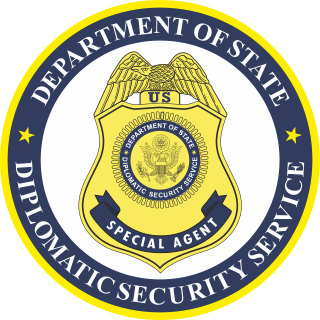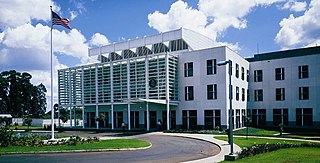Funding

SPEAR is funded by the ATA, and as of 2019 SPEAR has received approximately 33.7 million dollars. [4]
The Special Program for Embassy Augmentation and Response (SPEAR) is an antiterrorism and policing force in select regions around the world, designed to respond to crises and threats to US diplomats as well as US embassies and diplomatic missions. Law enforcement personnel from host nations are chosen to be members of SPEAR and are trained by the Diplomatic Security Service's (DSS) Office of Antiterrorism and Assistance (ATA). [1] SPEAR was established in 2014 in the aftermath of the 2012 Benghazi attack, in nations where the ability to protect high risk U.S personnel and property were weak. [2] Since its inception, SPEAR personnel have by mid-2021 provided extra security for more than 500 diplomatic affairs. [3]

SPEAR is funded by the ATA, and as of 2019 SPEAR has received approximately 33.7 million dollars. [4]
By mid-2021, SPEAR has trained over 400 law enforcement officers in participating SPEAR Nations. [1] SPEAR teams work with the US embassy to conduct joint readiness exercises with embassy forces as well as the US marine security guards. SPEAR also holds annual Summit's in which participating nations will send their SPEAR team to take part in joint training and competitions. It held its first summit in 2018.
The inaugural SPEAR Summit challenge was held in Nairobi, Kenya from December 10-14, 2018. SPEAR teams from Mali, Tunisia, Niger, and Kenya participated alongside a Kenyan National Police response unit as well as a team from the U.S Embassy's Regional Service Office. The training consisted of firearm proficiency, field medicine, personnel fitness, IED identification and response, and personnel recovery and evacuation. [5]
The 2019 SPEAR Summit was a five day conference held in Thiés, Senegal from December 2-6, 2019. SPEAR teams from Burkina Faso, Chad, Kenya, Mali, Niger, Tunisia, and South Sudan participated, alongside Senegalese law enforcement teams. The training and competition covered field medicine, firing and range familiarization, IED identification and response, teamwork obstacle courses, and evacuating personnel. At the end of the conference, team Tunisia was declared the winner of the 2019 SPEAR Summit Challenge. [6]
On January 19th, 2019, a SPEAR team was deployed in response to the Dusit2 complex attack in Nairobi. In the process of clearing the complex and rescuing civilians, the SPEAR team fought and killed two out of the five terrorists directing the attack. Two SPEAR members were seriously injured from a grenade explosion, but a third member was able to administer first aid to the wounded and they were later evacuated from the site. The terrorist attack conducted by Al-Shabaab killed 21 civilians with security services escorting more than 700 people out of the complex. [7] Just a month prior to the attack, Kenyan counterterrorism forces and Kenyan SPEAR collaborated with the US Regional Security Office to exercise real time attack scenarios similar to the attack at the Dusit. [7] The Kenyan SPEAR team consists of officers from the General Service Unit (GSU), which is a specialized military group within the Kenyan police service. [8] [9]
The SPEAR team in Mali is frequently deployed to escort and provide protection to the US Ambassador during his diplomatic missions outside of the nations capital of Bamako. [3]
Nigeria's SPEAR team received praise from the DSS for their work in protecting US diplomats during Nigerian protests in October of 2020. The team based in Lagos, had much of their success attributed to their primary backgrounds as local police officers, as their "familiarity with local conditions, customs, and laws makes them highly effective at de-escalating potential security situations between consulate personnel, the local population, or other security services." [10] The Nigerian SPEAR team is the only SPEAR team to have a naval part, as they have two boats which they use as urban transport. Its 47 members are recruited from the Nigerian Mobile Police (MOPOL) including an American mentor. [10]
In a report released by the US State Department Inspector General it outlined several problems with parts of the program. It stated that some SPEAR units failed to properly inventory equipment and lost track of dozens of vehicles that were loaned to them from the State department. The report also pointed out that some of the SPEAR mentors who were US contractors were behaving too much like US government officials, which is a breach of code. Its most scathing complaint however was about the SPEAR team in Mauritania. Based in the capital city of Nouakchott, this SPEAR team had 3.6 million dollars invested in it, but was grossly underperforming to the point where the report recommended terminating the SPEAR program there. The report found that there was no process in place to terminate a SPEAR program, but processes have been put in place and actions have been taken to disband the SPEAR program in Mauritania. [3]

The Bureau of Diplomatic Security, more commonly known as Diplomatic Security, or DS, is the security and law enforcement arm of the United States Department of State. DS conducts international investigations, threat analysis, cyber security, counterterrorism, and protection of people, property, and information. DS's mission is to provide a safe and secure environment for officials to carry out U.S. foreign policy.

The United States Diplomatic Security Service is the federal law enforcement and security arm of the U.S. Department of State. It is responsible primarily for protecting diplomatic assets, personnel, and information, and combating visa and passport fraud. The agency's activities include counterterrorism, counterintelligence, cybersecurity, and criminal investigations.

The individual member states of the African Union (AU) coordinate foreign policy through this agency, in addition to conducting their own international relations on a state-by-state basis. The AU represents the interests of African peoples at large in intergovernmental organizations (IGO's); for instance, it is a permanent observer at the United Nations' General Assembly.

Counterterrorism Special Detachment 88, or Densus 88, is an Indonesian National Police counter-terrorism squad formed on 30 June 2003, after the 2002 Bali bombings. It is funded, equipped, and trained by the United States through the Diplomatic Security Service's Antiterrorism Assistance Program and Australia.

The Mobile Security Deployments (MSD) is a small specialized tactical unit within the Diplomatic Security Service (DSS) of the United States Department of State. The MSD provides U.S. embassies and consulates with security support, protects the Secretary of State and other U.S. officials, including domestically as well as visiting foreign officials, and also provides security training at U.S embassies and consulates.

Operation Juniper Shield, formerly known as Operation Enduring Freedom – Trans Sahara (OEF-TS), is the military operation conducted by the United States and partner nations in the Sahara/Sahel region of Africa, consisting of counterterrorism efforts and policing of arms and drug trafficking across central Africa. It is part of the Global War on Terrorism (GWOT). The other OEF mission in Africa is Operation Enduring Freedom – Horn of Africa (OEF-HOA).

The 1998 United States embassy bombings were attacks that occurred on August 7, 1998. More than 200 people were killed in nearly simultaneous truck bomb explosions in two East African cities, one at the United States Embassy in Dar es Salaam, Tanzania, the other at the United States Embassy in Nairobi, Kenya.

The Award for Heroism is an award of the United States Department of State. It is presented to employees of State, USAID and Marine guards assigned to diplomatic and consular facilities in recognition of acts of courage or outstanding performance under unusually difficult or dangerous circumstances, whether or not in connection with the performance of assigned duties.

The United Nations Multidimensional Integrated Stabilization Mission in Mali is a United Nations peacekeeping mission in Mali. MINUSMA was established on 25 April 2013 by United Nations Security Council Resolution 2100 to stabilise the country after the Tuareg rebellion of 2012. It was officially deployed on 1 July, and has become the UN's most dangerous peacekeeping mission, with 209 peacekeepers killed out of a force of about 15,200.

The Foreign Emergency Support Team (FEST) is an interagency task force of the United States government, tasked with on-call short-notice responses to terrorist incidents across the world. It consists of personnel from military, intelligence, and diplomatic agencies, as well as other departments when required.

The Embassy of the United States of America to Kenya, located in Nairobi, is home to the diplomatic mission of the United States to the Republic of Kenya. The embassy opened in central Nairobi on 2 March 1964, when the United States established diplomatic relations with Kenya. In 1998, the original embassy was the target of a terrorist attack, after which a new embassy building was constructed in Gigiri, a suburb of Nairobi, in 2003.
The Missions Abroad and Special Operations is a specialized unit within the German Federal Criminal Police Office (BKA). The ASE is composed of specially selected and trained BKA personnel that typically operate in high-threat environments.